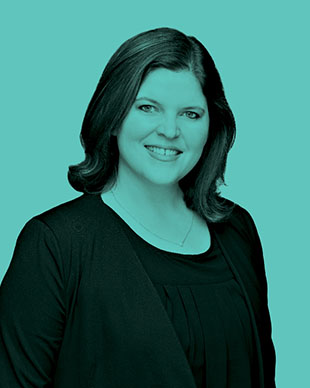IN PLAY: Amy Sexton
With an unconventional start behind her, this accounting manager is turning her past into a superpower for helping others thrive in challenging environments.
By Amy Sanchez | Summer 2025

For many accounting professionals, their pathway into the profession looked something like this: They graduated high school around age 18, completed a bachelor’s degree in accounting by age 22, are potentially pursuing their certified public accountant (CPA) credential thereafter, and obtained an entry-level role, perhaps at a public accounting firm.
For Amy Sexton, that traditional pathway couldn’t be further from her truth. By age 16, in rural Montana where she grew up, Sexton was working full-time in an office within the oil industry. At that time, oil was big, and a lot of well-paying jobs in the field were available to people without an education.
“Where I’m from, and with how I grew up, education just wasn’t a priority,” Sexton explains. “I would say it was almost discouraged and presented as a waste of time.”
Having been raised by parents of a stricter religious faith, Sexton had only received a formal education up through fourth grade: “My parents pulled my brother and me out of school with the plan of eventually homeschooling us. Their plan of what that looked like and what was important to learn varied greatly from accepted educational standards.”
Without formal schooling, Sexton sought most of her own education: “We had a bunch of books, access to the public library, and copies of Encyclopedia Britannica. I spent most of my time reading and practicing math problems from those.”
Eventually, the self-taught skills Sexton obtained from the hours she spent reading would come in handy when she made the decision to transition from the oil industry into the accounting profession—a decision made not by interest, but rather, for health reasons: “My asthma and allergies got really severe—I was starting to be hospitalized for it, so I was recommended a career change.”
Though, Sexton wasn’t completely sold on immediately jumping into a full career change: “At the time, I was in my mid-20s, and I felt like I was past the age where college made sense. So, I tried to see what I could accomplish on my own with the experience and connections I already had from Big Oil.”
After a number of interviews that went nowhere, Sexton finally began to consider college: “I did a bunch of college testing and found that my interests, personality, and skill sets were very aligned with the professions of engineer, scientist, professor, and accountant, so, I decided to look more into accounting.”
Pursuing an accounting degree was a crucial turning point for Sexton: “I went from having a certain mindset that I grew up with to realizing how much opportunity there is. It was definitely more than what I had been exposed to and taught to think about the accounting profession.”
Despite beginning college later than most, Sexton sees her untraditional pathway as a competitive advantage—specifically, as it relates to the constantly changing accounting landscape: “Because I went through life without a formal plan, and in the opposite way most people do, I’m a lot more comfortable navigating change and a landscape I haven’t prepared for.”
Over the years, this unique skill set has served Sexton well. Today, she serves as a manager within Wipfli’s outsourced chief financial officer and controller service line, where she’s currently working on obtaining her CPA credential—a professional and personal goal.
“I think because I spent so much of my life feeling undereducated, there’s a bit of me that needs this personal sense of achievement, taking something from its beginning to its completion,” she shares.
Rooted in her personal journey of having to advocate for her own opportunities in life, Sexton has also spent a large part of her educational and professional journey standing up for and mentoring others. In college, Sexton served two terms as a student board member on the Montana Board of Regents, a position she pursued after experiencing challenges with her student appeal process and seeing others experience the same.
Sexton also serves as a mentor to women in accounting, particularly in Wipfli’s overseas teams, which led her, in part, to being recognized with the Illinois CPA Society’s 2024 Women to Watch Award in the Emerging Leader category.
“I grew up with a very traditional set of values where I wasn’t encouraged to embrace a career—in certain parts of the world that’s very much the same case. Since I’ve made a career out of flourishing in environments that weren’t really set up for my immediate success, I feel like I’m particularly well-suited to help women thrive when they’re in that same environment.”
Despite the many challenges and setbacks Sexton experienced throughout her life, she now has the foresight to see them as formative: “If I could go back and change certain things, I would. But at the same time, I am where I am because those experiences have given me a good work ethic and taught me to not give up when things get hard.”
Related Content: